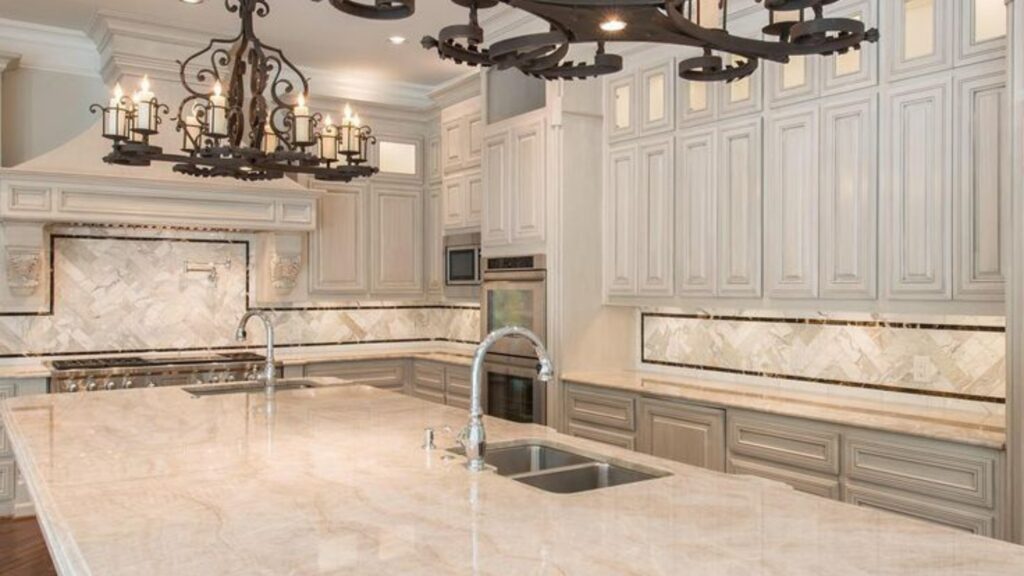What do you really want to know—how long granite countertops last, or how long yours will?
Because let’s be honest: there’s a big difference between showroom stone and the one taking the heat in your kitchen. Daily use, cleaning habits, and sealing schedules—it all adds up. But we will tell you how long yours is expected to last in your busy kitchen, depending on certain factors.
At Distinctive Surfaces, we’ve fabricated and installed thousands of countertops across the Capital Region, and we’ve seen firsthand what keeps granite looking incredible decades later—and what doesn’t. This guide breaks it down clearly so you can make the kind of investment that lasts.
What Makes Granite Durable in High-Traffic Homes?
Granite isn’t just beautiful—it’s born to take a beating. Formed deep beneath the earth under intense heat and pressure, each slab of granite is a compressed blend of quartz, feldspar, and other minerals that make it one of the hardest natural materials you can put in your home. That’s why granite countertops are known for their resistance to scratches, stains, and high temperatures.
But durability doesn’t mean indestructible.
In a high-traffic kitchen, granite shines when it’s supported by smart habits. Picture this: the kitchen island isn’t just for meal prep—it’s homework central, baking station, and the place everyone drops their keys. Granite handles the wear and tear, but sealing and simple upkeep help it stay sharp through it all.
Granite countertops can last for decades, but only when treated with the same care that went into choosing them. That’s the part we’ll dig into next.
How Long Do Granite Countertops Last—Realistically?
Granite countertops can last for decades—but what does that really mean?
It means that after a few decades, they’re still stunning after the cabinet handles have changed three times. It means they outlast trendy backsplashes and outwork more than one oven. But when a granite countertop starts to lose its seal, shows deep stains that won’t lift, or develops chips that make you cringe every time you clean, it’s no longer doing its job.
With proper care and maintenance, granite holds strong for 20 years or more. Some homeowners have stone that looks showroom-ready even after 25 years.
But that longevity depends on a few variables: the type of granite you choose, how porous it is, the quality of the finish, and—frankly—how you treat it.
Granite’s edge lies in its natural resilience and ability to take heat, scratches, and real-life wear without flinching. Plus, its one-of-a-kind visual character gives kitchens and bathrooms a warmth that engineered materials sometimes can’t replicate.
Still, not all slabs are created equal. Some granite types—especially softer or highly porous varieties—may only last 10 years or less in a high-traffic kitchen if they’re not sealed and cared for properly. The good news? Knowing what to look for and how to maintain it can make all the difference. More on that next.
What Wears Granite Down Over Time?
Granite is a highly durable material, but like anything in a high-traffic kitchen, it has its limits. The good news? Most wear and tear isn’t the result of a failing stone—it’s from habits that stack up over time. Here’s what really eats away at your granite countertop’s longevity:
1. Skipping the Seal
Granite is a porous material, which means without proper sealing, it can absorb liquids—and with them, stains, bacteria, and lingering odors. That glass of wine you spilled or the coffee ring from last week? They can sink in if your countertop isn’t protected. A simple water-bead test (drop water on the surface and watch if it soaks in) can tell you when it’s time to reseal.
2. Harsh Cleaners
Abrasive cleaners and anything acidic—think lemon-based sprays or vinegar—can eat away at your countertop sealant. Over time, they dull the finish and weaken the stone’s resistance to stains. Stick with mild dish soap and a soft cloth for daily cleanup.
3. Direct Heat
Granite can withstand high temperatures, but constant exposure to hot pots and pans can stress the stone and cause thermal shock, especially near seams or edges. Use trivets or hot pads. It’s a two-second habit that can save you years of performance.
4. Skipping the Cutting Board
Granite is highly resistant to scratches, but it’s not immune. Cutting directly on granite can dull your knives, wear down the sealant, and eventually chip delicate edges. Always use a board—your counters (and blades) will thank you.
These aren’t dealbreakers—they’re just reminders that maintaining granite is about consistency, not effort. A few smart habits—like resealing every 1–3 years and avoiding harsh products—keep your granite countertops looking and performing like new for decades.
Final Verdict: What You’re Really Paying For
Granite countertops aren’t just about today’s design—they’re about the years ahead.
When you choose granite, you’re not picking a trend. You’re investing in a countertop material that can outlast your appliances, keep its natural beauty, and hold up to everything life throws at it. From high-traffic areas like kitchens to busy family bathrooms, granite countertops are made to stand the test of time, with far fewer repairs or replacements than cheaper options.
Yes, it requires proper care and maintenance. Yes, it helps to reseal and use cutting boards and trivets. But what you get in return is more than just a durable surface.
You’re not just choosing a countertop—you’re choosing the backdrop to family dinners, morning coffees, and everyday moments. Make it last.
Need help finding the perfect countertop for your home? At Distinctive Surfaces, we help homeowners looking for durability, style, and peace of mind choose stone countertops that are made to last. Let’s talk.
Frequently Asked Questions
Quartz vs. Granite: Which Lasts Longer in Busy Homes?
Quartz and granite are both known for their durability, but they shine in different ways. If you want natural stone with heat resistance and unique character, granite offers a timeless edge. It’s ideal for cooks who move fast and don’t always reach for a trivet.
On the other hand, quartz countertops are highly resistant to stains, don’t require sealing, and offer a more uniform look—perfect if you value ease over organic variation. In the end, the right surface depends on how you use your kitchen or bathroom every day.
How do I know when my granite needs to be resealed?
An easy test: drip a few drops of water on your countertop. If it darkens or absorbs quickly, it’s time to reseal. Granite is a porous material, and while properly sealed granite is highly resistant to stains, that protection fades over time. Resealing every 1–3 years helps maintain both appearance and performance, especially in high-traffic zones like kitchens.
Can granite countertops chip or crack?
They can—but rarely. Granite is a natural material, and while incredibly strong, its edges and corners can chip or crack under sudden impact (like dropping a cast-iron skillet). The good news? Chips are often repairable, and with proper maintenance and smart use, most homeowners never see damage. Using cutting boards and avoiding sharp blows near edges goes a long way.
Does granite come in different styles or colors?
Absolutely. One of the things that makes granite such a popular choice for homeowners is the stunning range of colors, patterns, and finishes. From dramatic dark slabs to soft neutrals with subtle veining, granite slabs are like nature’s artwork—no two are exactly alike. If you want something long-lasting that still feels personal, granite is hard to beat.

